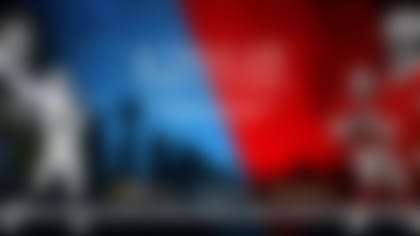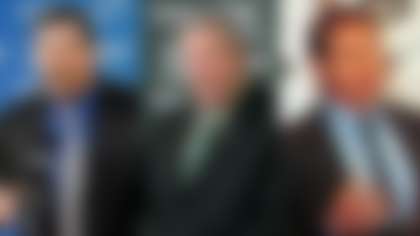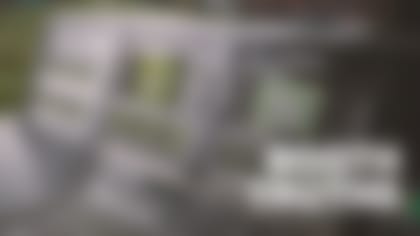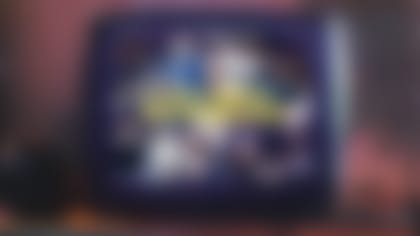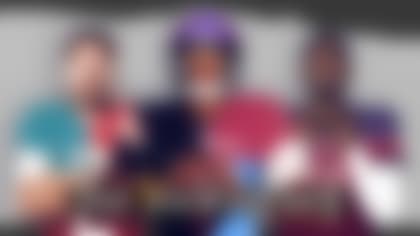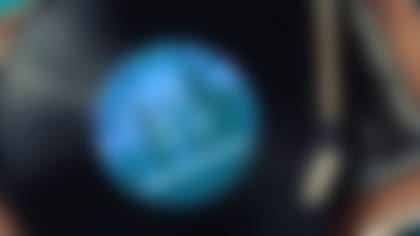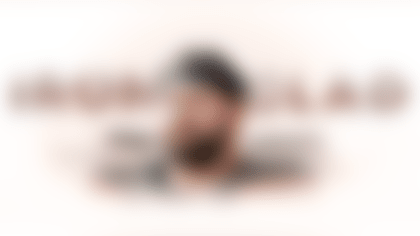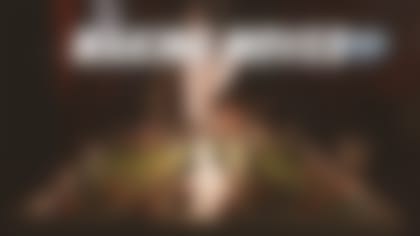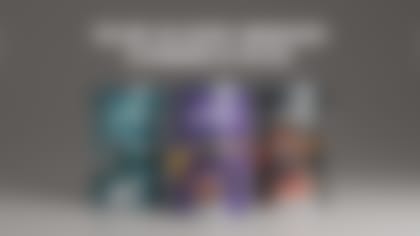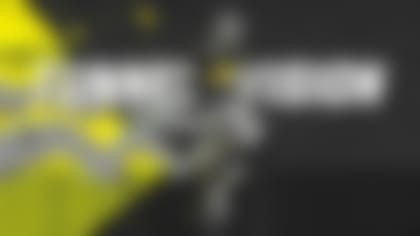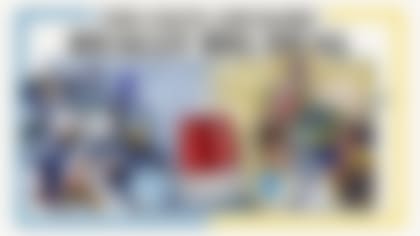The Cowboys-49ers rivalry was about more than wins and losses. It was a decades-long clash involving big names and unforgettable moments.
By Michael Silver | Published Dec. 14, 2015
Ronnie Lott remembers the moment he fully grasped the intensity of the rivalry between the San Francisco 49ers and Dallas Cowboys, during a high-speed interaction that underscored the pedal-to-the-metal passion of a frustrated fan base.
Lott, then a rookie defensive back who had helped transform the Niners from lackluster to legit, was already striking fear into the hearts of opponents with his punishing style -- but on this southbound trip down Interstate 280 toward the 49ers' training facility in Redwood City nearly 34 years ago, he was the one who became momentarily scared.
"I was driving down the freeway, and a fan was yelling at me," the future first-ballot Hall of Famer recalls. "I literally thought it was road rage. Finally, I realized he was saying, 'Frickin' beat Dallas!' That was an unbelievable moment. I don't think people realize how, for some people, beating that team was the Super Bowl."
A few days later, at Candlestick Park, the 49ers would defeat the Cowboys in one of the most memorable games in NFL history. Joe Montana's indelible touchdown pass to Dwight Clark -- soon to be immortalized as "The Catch" -- propelled San Francisco to a 28-27 victory in the 1981 NFC Championship Game, setting up the first of the Niners' four Super Bowl victories during the decade.
In retrospect, the epic triumph's significance is that it launched one extended run of excellence and essentially ended another. While the Cowboys did return to the NFC Championship Game the following year, they proceeded to fall off throughout the duration of the Tom Landry era.
At the time, however, San Francisco's shining moment turned up the heat on a rivalry that would soon rank among the sports world's fiercest. Long before 49ers All-Pro receiver Terrell Owens danced on the Texas star early in the 2000 season, the enmity between the two franchises and respective fan bases was palpable, largely because of what each team's triumphs had cost the other.
"It was competition at the highest level," recalls Eric Davis, a standout cornerback for the 49ers from 1990 to '95. "Living it, being a part of it, breathing it, it truly was one of those almost sibling rivalries.
"It was built on a certain respect, but it was a fight -- and it was about blood.
"You had to beat them to get what you wanted, and we knew they felt the exact same way."
During a 24-year span beginning with the 1970 postseason, the two teams would meet seven times in the playoffs, with a conference title at stake in six of those meetings. The lone divisional-round clash, in 1972, was the most heartbreaking of all for the 49ers: Having dropped NFC championship games to the Cowboys in each of the previous two seasons, one at Kezar Stadium (which they'd since vacated for Candlestick) and one at Texas Stadium, San Francisco felt poised to reverse the outcome and make a run at its first Super Bowl.
Vic Washington returned the opening kickoff 97 yards for a touchdown, sending the Candlestick crowd into a frenzy, and the 49ers jumped out to a 21-3 lead. They were up by 12 late in the fourth quarter until Cowboys quarterback Roger Staubach -- who had replaced Craig Morton midway through the second half -- threw a pair of touchdown passes in the final two minutes, sandwiched around an onside-kick recovery, to pull out a stunning 30-28 Dallas victory.
Nine years later, the 49ers, who'd won just eight games in future Hall of Fame coach Bill Walsh's first two seasons, shocked the NFL with a 13-3 regular season, including a 45-14 thrashing of the Cowboys at Candlestick in October. As Montana would recall in my 2013 homage to Candlestick, "It was that game that kind of pushed us over the edge, to get us to believe that we were now at that level where we could compete for a championship. After we beat the Cowboys, they'd been talking about how they didn't have respect for us, even though we'd just beaten them by a bunch. That was kind of where we left off."
In the rematch, after coming up just short of sacking Montana on the winning score, Cowboys defensive end Ed (Too Tall) Jones watched Clark leap to make the winning Catch and told the soon-to-be-legendary quarterback, "You just beat America's Team."
Replied Montana: "Well, you can sit at home with the rest of America and watch the Super Bowl."
While the Niners would go on to become the Team of the '80s, the Cowboys were headed for a decline that led to the 1989 firing of legendary coach Landry by new owner Jerry Jones. The highly unpopular move included the hiring of brash University of Miami coach Jimmy Johnson to replace Landry. Like Walsh, Johnson struggled at the outset, going 1-15 in his first season. However, he managed to guide the Cowboys to the playoffs in Year 3 and, the following season, coached Dallas to a 30-20 upset of the Niners in the 1992 NFC Championship Game at Candlestick.
"I guess the 49ers rivalry was special, because when I came into the league, we were the worst team in the league, and the 49ers were the best," Johnson says. "To go from 1-15 to competing with the 49ers, to me that was a tremendous accomplishment. In '92, we weren't the best team; we were the best team that day, and we beat them on their field."
The Cowboys went on to win the Super Bowl and, predictably, met the Niners the following year in a title-game rematch -- this time, at Texas Stadium. Heading into that much-hyped showdown, Johnson was sure his team was better. So, in a celebrated Dallas-area radio appearance three nights before the game, he took the liberty of proclaiming, "We will win the ballgame. And you can put it in three-inch headlines."
The following morning, Niners coach George Seifert responded on a San Francisco radio station, "Well, the man's got balls, I'll tell you that. I don't know if they're brass or papier-mâché. We'll find out here pretty soon."
By the time the two teams took the field, they resembled guests on "The Jerry Springer Show." Among the many pregame skirmishes were shoving matches involving Jerry Rice, the Niners' future Hall of Fame wideout, and Dallas defensive backs Kevin Smith and James Washington.
It was built on a certain respect, but it was a fight -- and it was about blood. Eric Davis
When Rice went out to the 50-yard line for the pregame coin toss, Staubach -- who had long before retired, and was the Cowboys' honorary captain for the game -- extended his hand, but the riled-up receiver refused to shake it. Rice picked up a personal foul in the first quarter and the Niners suffered a devastating 38-21 defeat to the Cowboys, who went on to capture a second consecutive Super Bowl triumph.
"When I went on the radio and said that, I was not aware of all the commotion it was gonna cause," Johnson insists. "And I did not expect that response from the 49ers. Their organization was pure class. Their coaches were first-class; their players were first-class. For them to have such a negative response to my off-the-cuff comment on a radio show, and for Jerry Rice to get a 15-yard penalty ... I believe it had an effect on their play.
"[Public relations director] Rich Dalrymple had asked me, 'Why in the world would you say that?' I scrawled out a list of reasons on a yellow pad of paper. The first was, 'I think we will win' ... the second was, 'If we don't, I'm gonna be miserable anyway.' ... And then there was No. 4: 'Who really gives a s---?' Well, apparently, the 49ers did."
The Niners never got their revenge on Johnson. He and Jones parted ways after an infamous brouhaha at the annual league meeting the following March, and the owner hired former Oklahoma coaching legend Barry Switzer to replace him. The Cowboys lost to the Niners in a mid-November clash at Candlestick and returned for a rematch in the '94 NFC Championship Game two months later. Spurred by Davis' early pick-six of future Hall of Fame quarterback Troy Aikman, the 49ers jumped all over their rivals, taking a 21-0 first quarter lead en route to a 38-28 victory.
"There was no 'maybe' ... There is not a player that understands what it means to be a Niner that could have survived losing that game," Davis says. "It all started a year earlier, walking off their field -- back then, we never, ever thought we were gonna lose. We were like, 'How did this happen?' I remember standing there looking at Tim (McDonald, the Niners' All-Pro safety) and thinking, They were better than us. That feeling, that was the first time I ever had that feeling as a Niner. And it started that day.
"During those years, we were the best two teams -- by far. There was no one remotely close. And we were all in our primes, and we had all grown up together. When you lost to them, you thought, 'I lost the Super Bowl.' Because you did."
Two weeks after their '94 title game triumph, the Niners captured their fifth Super Bowl in 14 seasons, the first with future Hall of Famer Steve Young at quarterback. The Cowboys went on to win another Super Bowl championship the following year -- avoiding the Niners, who'd suffered a divisional-round playoff upset loss to Brett Favre and the Green Bay Packers. That deprived Dallas of a chance to avenge an embarrassing regular-season defeat to San Francisco at Texas Stadium in which the Niners, heavy underdogs with Elvis Grbac playing for an injured Young, crushed the Cowboys, 38-20, after jumping out to a 31-7 lead.
In the two decades since that game, there have been nine additional meetings between the two teams -- none in the postseason -- and any lingering bitterness has long since dissipated. There was, however, a significant flareup in September of 2000 when Owens, who'd succeeded Rice as San Francisco's marquee receiver, performed a pair of touchdown celebrations in a 41-24 Niners victory that many deemed disrespectful.
In '92, we weren't the best team; we were the best team that day, and we beat them on their field. Jimmy Johnson
Twice, Owens ran from the end zone to midfield, where he stood on the Cowboys' blue star insignia, spread his arms wide and looked up through the opening in the middle of the Texas Stadium roof. The second time it happened, Dallas safety George Teague angrily leveled Owens, and players from both teams spilled into the ensuing fray.
If the Cowboys and their fans considered Owens' preening to have been borderline sacrilegious, the coach who'd twice vanquished the Niners -- and prompted his counterpart to question the makeup of his family jewels -- had a much different interpretation.
Simply put, Johnson did not give a damn.
"I thought it was hilarious what Owens did," Johnson says. "And I thought it was funny that the guy [Teague] went after him. I loved it when he stood on the star. It was the kind of thing I would have done when I was coaching at Miami. I thought it was cool."
Eight years later, in the same stadium, Owens -- then with the Cowboys -- caught a 75-yard touchdown pass from Tony Romo in a 35-22 victory over the Niners, without incident. By then, the rivalry had cooled considerably, but make no mistake: In the future, should these two franchises stand between one another and a championship, fans in Northern California and North Texas will be screaming at a new generation of players as they drive along the interstate, pedal to the metal.
